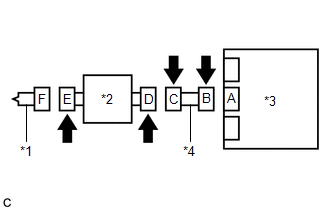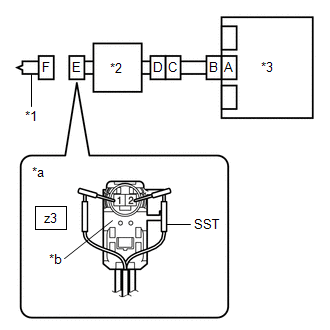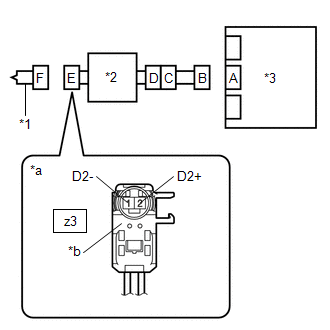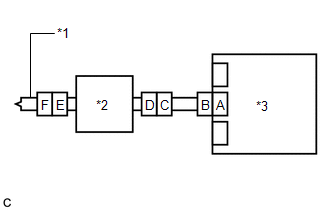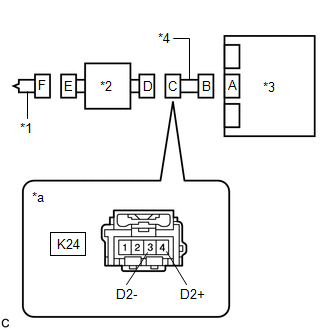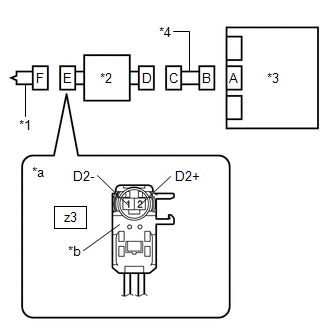| Last Modified: 02-14-2025 | 6.11:8.1.0 | Doc ID: RM1000000015C13 |
| Model Year Start: 2018 | Model: Camry HV | Prod Date Range: [07/2017 - ] |
| Title: SUPPLEMENTAL RESTRAINT SYSTEMS: AIRBAG SYSTEM: B1810-B1813; Short in D Squib (Dual Stage - 2nd Step) Circuit; 2018 - 2024 MY Camry HV [07/2017 - ] | ||
|
DTC |
B1810 |
Short in D Squib (Dual Stage - 2nd Step) Circuit |
|
DTC |
B1811 |
Open in D Squib (Dual Stage - 2nd Step) Circuit |
|
DTC |
B1812 |
Short in D Squib (Dual Stage - 2nd Step) Circuit (to Ground) |
|
DTC |
B1813 |
Short in D Squib (Dual Stage - 2nd Step) Circuit (to +B) |
DESCRIPTION
The driver squib 2nd step circuit consists of the airbag sensor assembly, spiral cable sub-assembly and horn button assembly.
The airbag sensor assembly uses this circuit to deploy the airbag when deployment conditions are met.
These DTCs are stored when a malfunction is detected in the driver squib 2nd step circuit.
|
DTC No. |
Detection Item |
DTC Detection Condition |
Trouble Area |
Warning Indicate |
Test Mode / Check Mode |
|---|---|---|---|---|---|
|
B1810 |
Short in D Squib (Dual Stage - 2nd Step) Circuit |
|
|
Comes on |
Applies to check mode |
|
B1811 |
Open in D Squib (Dual Stage - 2nd Step) Circuit |
|
|
Comes on |
Applies to check mode |
|
B1812 |
Short in D Squib (Dual Stage - 2nd Step) Circuit (to Ground) |
|
|
Comes on |
Applies to check mode |
|
B1813 |
Short in D Squib (Dual Stage - 2nd Step) Circuit (to +B) |
|
|
Comes on |
Applies to check mode |
WIRING DIAGRAM
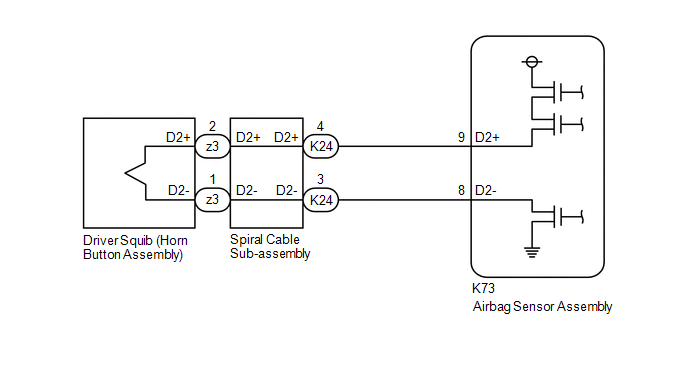
CAUTION / NOTICE / HINT
NOTICE:
After turning the power switch off, waiting time may be required before disconnecting the cable from the negative (-) auxiliary battery terminal. Therefore, make sure to read the disconnecting the cable from the negative (-) auxiliary battery terminal notices before proceeding with work.
HINT:
PROCEDURE
|
1. |
CHECK CONNECTORS |
|
(a) Turn the power switch off. |
|
(b) Disconnect the cable from the negative (-) auxiliary battery terminal.
CAUTION:
Wait at least 90 seconds after disconnecting the cable from the negative (-) auxiliary battery terminal to disable the SRS system.
(c) Check that the connectors are properly connected to the horn button assembly, spiral cable sub-assembly and airbag sensor assembly.
OK:
The connectors are properly connected.
HINT:
If the connectors are not properly connected, reconnect the connectors and proceed to the next inspection.
(d) Disconnect the connectors from the horn button assembly, spiral cable sub-assembly and airbag sensor assembly.
(e) Check that the terminals of the connectors are not deformed or damaged.
OK:
The terminals are not deformed or damaged.
(f) Check that the spiral cable sub-assembly connector (on the horn button assembly side) is not loose, deformed or damaged.
OK:
The airbag connector locking button is not disengaged, and the claw of the lock is not deformed or damaged.
(g) Check that the short springs of the activation prevention mechanisms of the instrument panel wire connector and spiral cable sub-assembly connector are not deformed or damaged.
OK:
The short springs are not deformed or damaged.
| NG |

|
REPLACE WIRE HARNESS |
|
|
2. |
CHECK HORN BUTTON ASSEMBLY |
|
(a) Connect the instrument panel wire to the airbag sensor assembly and spiral cable sub-assembly. |
|
(b) Connect SST (resistance 2.1 Ω) to connector E (black connector).
CAUTION:
Never connect a tester to the horn button assembly for measurement, as this may lead to a serious injury due to airbag deployment.
NOTICE:
- Do not forcibly insert SST into the terminals of the connector when connecting it.
- Insert SST straight into the terminals of the connector.
SST: 09843-18061
(c) Connect the cable to the negative (-) auxiliary battery terminal.
(d) Turn the power switch on (IG), and wait for at least 60 seconds.
(e) Clear the DTCs stored in memory.
Body Electrical > SRS Airbag > Clear DTCs
(f) Turn the power switch off.
(g) Turn the power switch on (IG), and wait for at least 60 seconds.
(h) Check for DTCs.
Body Electrical > SRS Airbag > Trouble Codes
OK:
DTC B1810, B1811, B1812 or B1813 is not output.
HINT:
Codes other than DTCs B1810, B1811, B1812 and B1813 may be output at this time, but they are not related to this check.
(i) Turn the power switch off.
(j) Disconnect the cable from the negative (-) auxiliary battery terminal.
CAUTION:
Wait at least 90 seconds after disconnecting the cable from the negative (-) auxiliary battery terminal to disable the SRS system.
(k) Disconnect SST from connector E.
| OK |

|
|
|
3. |
CHECK DRIVER SQUIB 2ND STEP CIRCUIT |
|
(a) Disconnect the instrument panel wire from the airbag sensor assembly. |
|
(b) Check for a short to B+ in the circuit.
(1) Connect the cable to the negative (-) auxiliary battery terminal.
(2) Turn the power switch on (IG).
(3) Measure the voltage according to the value(s) in the table below.
Standard Voltage:
|
Tester Connection |
Condition |
Specified Condition |
|---|---|---|
|
z3-2 (D2+) - Body ground |
Power switch on (IG) |
Below 1 V |
|
z3-1 (D2-) - Body ground |
Power switch on (IG) |
Below 1 V |
(4) Turn the power switch off.
(5) Disconnect the cable from the negative (-) auxiliary battery terminal.
CAUTION:
Wait at least 90 seconds after disconnecting the cable from the negative (-) auxiliary battery terminal to disable the SRS system.
(c) Check for an open in the circuit.
(1) Measure the resistance according to the value(s) in the table below.
Standard Resistance:
|
Tester Connection |
Condition |
Specified Condition |
|---|---|---|
|
z3-2 (D2+) - z3-1 (D2-) |
Always |
Below 1 Ω |
(d) Check for a short to ground in the circuit.
(1) Measure the resistance according to the value(s) in the table below.
Standard Resistance:
|
Tester Connection |
Condition |
Specified Condition |
|---|---|---|
|
z3-2 (D2+) - Body ground |
Always |
1 MΩ or higher |
|
z3-1 (D2-) - Body ground |
Always |
1 MΩ or higher |
(e) Check for a short in the circuit.
(1) Release the activation prevention mechanism built into connector B.
(2) Measure the resistance according to the value(s) in the table below.
Standard Resistance:
|
Tester Connection |
Condition |
Specified Condition |
|---|---|---|
|
z3-2 (D2+) - z3-1 (D2-) |
Always |
1 MΩ or higher |
(3) Restore the released activation prevention mechanism of connector B to the original condition.
| NG |

|
|
|
4. |
CHECK DTC |
|
(a) Connect the connectors to the horn button assembly and airbag sensor assembly. |
|
(b) Connect the cable to the negative (-) auxiliary battery terminal.
(c) Turn the power switch on (IG), and wait for at least 60 seconds.
(d) Clear the DTCs stored in memory.
Body Electrical > SRS Airbag > Clear DTCs
(e) Turn the power switch off.
(f) Turn the power switch on (IG), and wait for at least 60 seconds.
(g) Check for DTCs.
Body Electrical > SRS Airbag > Trouble Codes
OK:
DTC B1810, B1811, B1812 or B1813 is not output.
HINT:
Codes other than DTCs B1810, B1811, B1812 and B1813 may be output at this time, but they are not related to this check.
| OK |

|
| NG |

|
|
5. |
CHECK INSTRUMENT PANEL WIRE |
|
(a) Disconnect the instrument panel wire from the spiral cable sub-assembly. |
|
(b) Check for a short to B+ in the circuit.
(1) Connect the cable to the negative (-) auxiliary battery terminal.
(2) Turn the power switch on (IG).
(3) Measure the voltage according to the value(s) in the table below.
Standard Voltage:
|
Tester Connection |
Condition |
Specified Condition |
|---|---|---|
|
K24-4 (D2+) - Body ground |
Power switch on (IG) |
Below 1 V |
|
K24-3 (D2-) - Body ground |
Power switch on (IG) |
Below 1 V |
(4) Turn the power switch off.
(5) Disconnect the cable from the negative (-) auxiliary battery terminal.
CAUTION:
Wait at least 90 seconds after disconnecting the cable from the negative (-) auxiliary battery terminal to disable the SRS system.
(c) Check for an open in the circuit.
(1) Measure the resistance according to the value(s) in the table below.
Standard Resistance:
|
Tester Connection |
Condition |
Specified Condition |
|---|---|---|
|
K24-4 (D2+) - K24-3 (D2-) |
Always |
Below 1 Ω |
(d) Check for a short to ground in the circuit.
(1) Measure the resistance according to the value(s) in the table below.
Standard Resistance:
|
Tester Connection |
Condition |
Specified Condition |
|---|---|---|
|
K24-4 (D2+) - Body ground |
Always |
1 MΩ or higher |
|
K24-3 (D2-) - Body ground |
Always |
1 MΩ or higher |
(e) Check for a short in the circuit.
(1) Release the activation prevention mechanism built into connector B.
(2) Measure the resistance according to the value(s) in the table below.
Standard Resistance:
|
Tester Connection |
Condition |
Specified Condition |
|---|---|---|
|
K24-4 (D2+) - K24-3 (D2-) |
Always |
1 MΩ or higher |
(3) Restore the released activation prevention mechanism of connector B to the original condition.
| NG |

|
REPLACE INSTRUMENT PANEL WIRE |
|
|
6. |
CHECK SPIRAL CABLE SUB-ASSEMBLY |
|
(a) Check for a short to B+ in the circuit. (1) Connect the cable to the negative (-) auxiliary battery terminal. (2) Turn the power switch on (IG). (3) Measure the voltage according to the value(s) in the table below. Standard Voltage:
(4) Turn the power switch off. (5) Disconnect the cable from the negative (-) auxiliary battery terminal. CAUTION: Wait at least 90 seconds after disconnecting the cable from the negative (-) auxiliary battery terminal to disable the SRS system. |
|
(b) Check for an open in the circuit.
(1) Measure the resistance according to the value(s) in the table below.
Standard Resistance:
|
Tester Connection |
Condition |
Specified Condition |
|---|---|---|
|
z3-2 (D2+) - z3-1 (D2-) |
Always |
Below 1 Ω |
(c) Check for a short to ground in the circuit.
(1) Measure the resistance according to the value(s) in the table below.
Standard Resistance:
|
Tester Connection |
Condition |
Specified Condition |
|---|---|---|
|
z3-2 (D2+) - Body ground |
Always |
1 MΩ or higher |
|
z3-1 (D2-) - Body ground |
Always |
1 MΩ or higher |
(d) Check for a short in the circuit.
(1) Release the activation prevention mechanism built into connector D.
(2) Measure the resistance according to the value(s) in the table below.
Standard Resistance:
|
Tester Connection |
Condition |
Specified Condition |
|---|---|---|
|
z3-2 (D2+) - z3-1 (D2-) |
Always |
1 MΩ or higher |
(3) Restore the released activation prevention mechanism of connector D to the original condition.
| OK |

|
| NG |

|
|
|
|
![2018 - 2019 MY Camry HV [07/2017 - 09/2019]; INTRODUCTION: REPAIR INSTRUCTION: PRECAUTION](/t3Portal/stylegraphics/info.gif)
